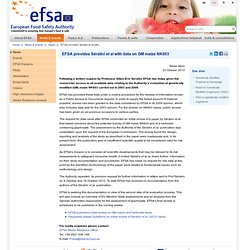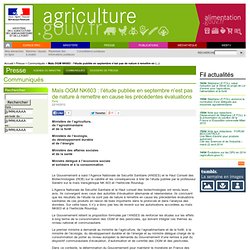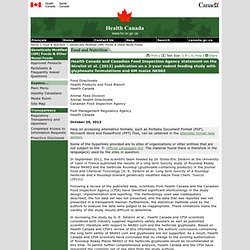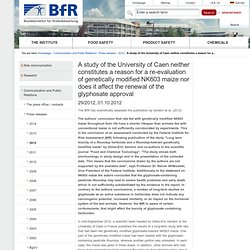

EFSA publishes initial review on GM maize and herbicide study (20121004) Press Release 4 October 2012 The European Food Safety Authority has concluded that a recent paper raising concerns about the potential toxicity of genetically modified (GM) maize NK603 and of a herbicide containing glyphosate is of insufficient scientific quality to be considered as valid for risk assessment.

EFSA’s initial review found that the design, reporting and analysis of the study, as outlined in the paper, are inadequate. To enable the fullest understanding of the study the Authority has invited authors Séralini et al to share key additional information. Such shortcomings mean that EFSA is presently unable to regard the authors’ conclusions as scientifically sound.
Statement of EFSA: Review of the Séralini et al. (2012) publication. EFSA Journal 2012;10(10):2910 [9 pp.]. doi:10.2903/j.efsa.2012.2910 European Food Safety Authority Acknowledgment EFSA wishes to thank the following EFSA staff: Saghir Bashir, Per Bergman, Danièle Court Marques, Claudia Paoletti, Manuela Tiramani, Didier Verloo and Elisabeth Waigmann for the support provided to this scientific output.

EFSA also thanks the peer reviewers of this statement Andrew Chesson (member of the GMO Panel) and Alberto Mantovani (member of the PPR panel).Contact sas@efsa.europa.eu. Preliminary review of the Séralini et al. (2012) publication.pdf. EFSA Letter to Séralini, 4 Oct 2012. EFSA Letter to Séralini, 4 Oct 2012.pdf. EFSA Letter to Séralini, 18 Oct 2012.
EFSA Letter to Séralini, 18 Oct 2012.pdf. Frequently Asked Questions on initial review of Séralini et al. (2012) study. On 19 September 2012, the scientific journal published a paper on their website by Séralini describing a 2-year feeding study in rats that investigates the health effects of genetically modified maize NK603 and of a herbicide containing the active substance glyphosate. The authors of the study conclude that GM maize NK603 and low levels of glyphosate herbicide formulations, at concentrations well below officially-set safe limits, induce severe adverse health effects, such as tumours, in rats. (Top) On 26 September, EFSA received an official request from the European Commission in relation to the Séralini paper - European Commission Mandate (0.1 Mb) .
The request contained five elements: to carry out a scientific review of the paper; to ask for any necessary clarifications from the paper’s authors; to advise whether the paper contained any scientific elements that could lead EFSA to reconsider its previous safety assessments of GM maize NK603; No. No. EFSA provides Séralini et al with data on GM maize NK603 (20121022) News Story 22 October 2012 Following a written request by Professor Gilles-Eric Séralini, EFSA has today given the researcher access to all available data relating to the Authority’s evaluation of genetically modified (GM) maize NK603 carried out in 2003 and 2009.

EFSA has provided these data under a routine procedure for the release of information known as a Public Access to Documents request. In order to supply the fullest amount of material possible, access has been granted to the data considered by EFSA in its 2009 opinion, which also includes data sets for the 2003 opinion. For the dossier on NK603 maize, public access has been given on six previous occasions to various parties. Avis des Académies nationales sur la publication de Séralini. Maïs OGM NK630 : l’étude publiée en septembre n’est pas de nature à remettre en cause les précédentes évaluations. Ministère de l’agriculture, de l’agroalimentaire et de la forêt Ministère de l’écologie, du développement durable et de l’énergie Ministère des affaires sociales et de la santé Ministre délégué à l’économie sociale et solidaire et à la consommation.

HCB - Haut Conseil des biotechnologies. HCB: Le HCB rend son avis sur l'etude Séralini.pdf. HCB: Opinion of the Scientific Committee. HCB: Avis du CS. HCB: CEES recommendation. HCB: Opinion of the Scientific Committee - Executive Summary. HCB: Press release 20121022. HCB: Le HCB saisi pour analyser l'etudeSéralini (CP).pdf. HCB: Recommandation du CEES. HCB: Saisine 2012-09-28-201801.pdf. ANSES: Composition du groupe de travail. ANSES: Audition du 10 octobre au matin. ANSES: Commentaires de Monsanto.
ANSES: Dossier de presse de présentation de l'avis. ANSES: Avis relatif à l'analyse de l'étude de Séralini (BIOT2012sa0227).pdf. ANSES: Audition du 10 octobre après-midi. Brazil: CTNBio Considered Opinion on Séralini Study. CTNBios presidency response to Séralini. Danish Food Institute : GM study does not meet the scientific standards. Advice of the Belgium Biosafety Council. Canada: statement on the Séralini publication. Food Directorate Health Products and Food Branch Health Canada Animal Feed Division Animal Health Directorate Canadian Food Inspection Agency Pest Management Regulatory Agency Health Canada October 25, 2012 Help on accessing alternative formats, such as Portable Document Format (PDF), Microsoft Word and PowerPoint (PPT) files, can be obtained in the alternate format help section.

Some of the hyperlinks provided are to sites of organizations or other entities that are not subject to the Official Languages Act. In September 2012, the scientific team headed by Dr. Following a review of the published data, scientists from Health Canada and the Canadian Food Inspection Agency (CFIA) have identified significant shortcomings in the study design, implementation and reporting.
In reviewing the study by G. Roundup Ready Maize NK603 is a herbicide tolerant maize variety first approved for Canadian food and feed use in 2001. Stay Connected with Health Canada's Social Media Tools! VIB concludes that Séralini study is not substantiated. VIB: Analyse rattenstudie Séralini et al.pdf. Bfr assessment of Séralini publication.pdf. Brf statement on Séralini paper. The BfR has scientifically assessed the publication by Séralini et al. (2012) The authors’ conclusion that rats fed with genetically modified NK603 maize throughout their life have a shorter lifespan than animals fed with conventional maize is not sufficiently corroborated by experiments.

This is the conclusion of an assessment conducted by the Federal Institute for Risk Assessment (BfR) following publication of the study "Long term toxicity of a Roundup herbicide and a Roundup-tolerant genetically modified maize" by Gilles-Eric Séralini and co-authors in the scientific journal "Food and Chemical Toxicology". European Society of Toxicologic Pathology Letter.